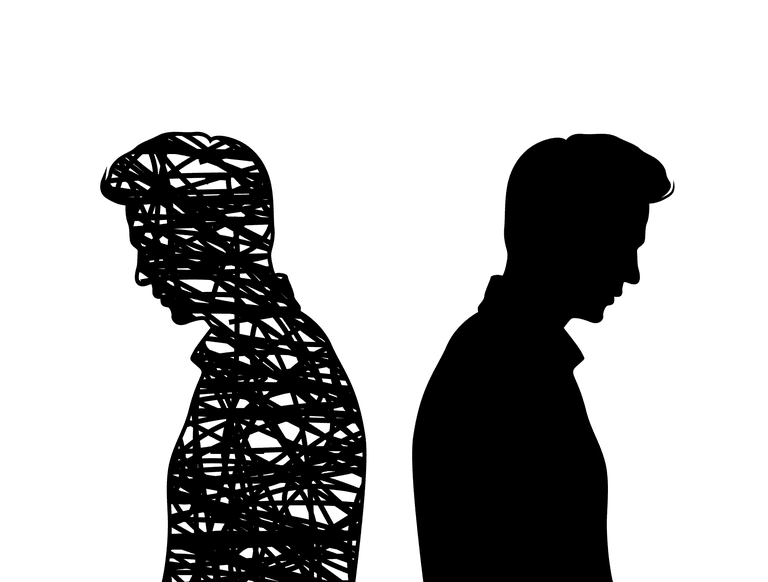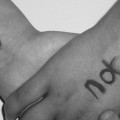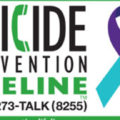
By Guest Author Nicole
Eight months after my dad died from suicide in 2017, I was walking on a college campus when I saw a sign that stated, in bold letters: Suicide is 100% Preventable. That message felt like a punch in the stomach.
I wanted to ignore it, but I couldn’t. It felt insensitive and offensive to me, so I took a picture of the sign, searched for the organization who posted it, and sent them an email. I told them how hurtful this language felt to me, personally, and that while I supported programs that work to prevent suicide, I pointed out that stating suicide is 100% preventable may seriously contribute to the guilt that survivors who lost someone to suicide were feeling.
I was relieved to get a compassionate response a few days later. The reply explained that they valued my perspective, that many people who work in their office also lost a friend or family member to suicide, and that they would address the language used. But weeks later, I still saw the same sign on campus. Overall, the experience felt frustrating and unproductive. And I realized that even if I managed to get this one sign removed, it would only be a small victory. Well-intended but poorly worded messages and stigmas surrounding suicide deaths will continue to exist.
September is Suicide Prevention Month and, in my experience, a lot of well-meaning people and organizations get this language wrong. It’s hard because the loss of my dad feels so private and personal, and seeing suicide prevention campaign in public places or on social media feel intrusive and emotionally exhausting. This month, to counteract some of the difficult messages that are being shared, I thought I’d share three of the most compassionate, comforting, and accurate messages that I found after losing my dad:
1. Suicide is never caused by one factor. Don’t let yourself fixate on one conversation or one bad moment – that alone did not cause your loved one’s death. No one is the sole influence on another’s life.
2. It is normal to feel complicated emotions, including anger toward people or institutions who impacted your loved one. Let yourself feel what you feel: write about it, talk to a therapist or grief group, cry. Don’t hold difficult emotions inside.
3. Grief is love. All of the pain you feel is because of love. And if love could have saved them, it would have. They would be here. It’s not your fault.
Reading these brings me comfort, and serves as a shield that helps counteract the other messages I encounter. And when I do see messages that make me feel guilty, I try to stand up to guilt with logic: I remind myself that I did what I could with what I knew at the time. I’d love to read any mantras or helpful, comforting messages that you come back to, too.




Thank you beyond words. Even in my SOS group I make it clear I do not go to suicide prevention walks or believe in phone lines . None of that would ever help someone intent on taking their life. They experience severe pain and darkness. My dear late husband would Never have reached out and made a 1-800 phone cal! He kept it secret . They all do. They wouldn’t be successful if they revealed it all . I agree with you so. Wish others , meaning well, would stop these campaigns to make themselves feel better. I am in excruciating PAIN every day . Thank u again.
I couldn’t have expressed it better. Thank you!
My perspective is a bit different. I attempted suicide once and have struggled with hopelessness and suicidal ideation my whole life.
During the time when I attempted suicide I would never have reached out to a hotline. But after that attempt, I saw the pain it brought my parents, and that was a motivation I’ve held onto ever since. So since then, whenever I’ve been close to hurting myself, I’ve looked for help.
I have called 800-number hotlines on multiple occasions, when it was 2am and the darkness was pressing in, and it really did help me to have a presence on the other end of the line who could hear my anguished sobs without making me worry I was a burden. They are definitely why I’m alive now.
Some people aren’t able to ask anyone for help. I’ve been there. But some people do reach out, and in those times, anonymity can be such a saving grace. That’s why I support hotlines. They do save some lives.
I’m sorry for the pain you’ve been through. I wish you peace.
I appreciate what you have said so much. You have captured exactly how I feel..i have lost 2 brothers to suicide and I feel exhausted at all the empty words offered. The guilt we carry is almost unbearable at times. Thank you for sharing your words of wisdom born out of your pain. I am so sorry .
I’m so sorry that you’ve experienced this pain twice. You’re right – the prevention language can feel so over-simplified and over-generalized and guilt-inducing and EXHAUSTING. It’s so frustrating. We deserve better.
The son’s suicide was not preventable, he had end stage Bipolar 1 and nothing could have cured him or given him back his healthy mind and life. And yet I also find myself telling his young adult friends that he could have made a different choice. That mental illness/brain disorders/depression are treatable, because they need to hear there is hope and options other than death. So as hurtful as the 100% preventable message feels to me, I understand the main target audience is people contemplating death. And that it may provide that last bit of hope to try living another day.
This resonates with me so much – thank you for putting in words what I feel, too. I have attended two “Walk Out of the Darkness” walks in honor of my son, but I leave with my guilt compounded. So thank you for your words. I feel a measure of relief and comfort that others who are grieving a loved one’s suicide also carry around this heavy burden of guilt. I need to remember your first point: Suicide is never caused by one factor. I know this in my head, and I am working on getting that into my heart as well.
I’m so sorry about your son. I, too, lost my 22yo son 5 years ago next month. And like you, I am trying to get my head and my heart to get in sync. I don’t think they ever will.
Thank you so much. I campaign for ‘Suicide Awareness’ rather than Prevention because as others have said, sometimes it just is not preventable. My husband had Severe Bipolar Disorder for 30+ years – he was totally exhausted with the battle against his mood swings when he took his life. Today, I can honestly say I did as much as I knew to keep him safe – but tomorrow I may not see it that way – yesterday, I was so close to giving up myself because of guilt. The wording is truly vital in such campaigns – however well-meaning they may be, they can be devastating.
Sending love and thanks to everyone here.
L x
Thank you for sharing. My son completed suicide after a break up. I can never know what feelings led to his final act, but I’m guessing that he just wanted the pain to stop. At that precise second in time, I doubt his death was preventable. I believe prevention awareness is vital to lowering rates. More awareness is a start. It starts a conversation. Hopefully those conversations will become more mainstream and mental health will become easier to talk about, discuss, and find help with if needed. Suicide prevention didn’t help save my child’s life, but hopefully in the ripple effect of his death, someone else’s child, friend, or family members death can be prevented. My child’s death has had an impact on hundreds, if not thousands, of people. I can only hope that we can make a difference together.
“None of that would ever help someone intent on taking their life.”
For some people, maybe. But for others, prevention measures absolutely can be the difference between utter despair and deciding to keep going.
In no way ever is suicide awareness, or attempts to prevent suicide, meant as a rebuke to those who have lost somebody. Why would we not want to save others the agony and horror, if we can?
I am so embarrassed and confused and just plain overwhelmed that my baby did this. I never saw it coming and all of these “walk out of the darkness” things and others just make me feel like ehe worst mom in the world. I NEVER had this on my radar. He was just 16. AND. When I read about prevention? Makes me feel like a bad mom. Because when I got his computer back -he las thing he checked – OH MY GOD – was the suicide online. That he did not call. I will forever feel guilty and like a horrible mom. This stuff – does not help – it only brings me down further.
I’m so sorry. Truly, my heart just goes out to you. You absolutely are a great mother! Please know that!
WOW!! This is the reason I don’t go on the suicide walks or participate in the SOS groups anymore….you said exactly what I realized 3 years ago . Thank you so incredibly much for pointing this out. You truly have hit the nail on the head…..and it’s clear from all these responses that you, I and everyone else following have felt it.
Wendy Hatch
Your article was very helpful, because I too resent hearing people say “suicide is 100% preventable”. Absolutely not true. Making this false assumption creates guilt and “shames” the survivors. When I hear such callous remarks I often wonder what kind of ego the creator of such nonsense has? This kind of thinking comes from the same place as “conversion therapy”, and is a very narrow view of the human condition. Thank you for your honesty.
My daughter did reach out and we tried every possible avenue to get her the help she needed. When they are determined, I’m afraid there is not much we can do to prevent it. My daughter waited till the one day I left the house for a guaranteed length of time and seized her opportunity.
Thank you so much truth
I am so sorry for your loss.
After losing my brother, I read and listened to a lot of stories about depression and suicide – just trying to understand why my brother couldn’t stay. I listened to one story where the mother said, the only thing selfish about her sons suicide was her desire for him to stay in this world that could not really help him. She said what if her son lived a long life absent of joy, constantly battling his demons.
I tried getting my brother help. He had family that loved him, and the resources to get help. I was helping him get his life in order and we were going to move in together. In the end, I think I just made it easier for him to leave.
I can related to everything said here. We lost our precious son almost 4 years ago. He was 23 yrs old. I was told that as time goes by the the pain becomes less intense, and for the most part, that is true; however there are times when there are triggers that bring it all to the surface again. That is what happened this week for my husband and me. As a mother, the guilt never goes away. It’s written all over my face. By accident, I came across a movie today on Netflix named “Evelyn”. I watched it. It’s about a family that lost their son & brother to suicide. It was over 10 years after the suicide of their son & brother. They go on a hiking trip through Scotland and England in memory of their brother (& son). They talk about their brother (& son). I can relate to their feelings of not being able to talk about their son & brother. My husband, my older son and me have had a difficult time talking about our son, David. We are like 3 separate silos of grief and guilt. The movie helped me. The mother’s feeling of guilt reflected my own feelings. It gave me validation that I wasn’t alone with these feelings. I recommend this movie. I personally have felt so alone in my grief and guilt. I have isolated myself from the world as a result of it. This movie made me feel that my feelings are normal. Much love to you all. I share in your grief.
I have just lost my son to mental illness this summer. He had suffered his whole life from a bipolar disorder and one night took control of his disease by using what courage he had left and ended his life. He was 40 years old, going thru a messy divorce and felt that once again, everything was his fault.( which it wasn’t) He just wanted to stop the pain. When I see this statement, ‘suicide is 100% preventable’, I get very upset because I tried everything to get him the help he needed. I just wish he would have reached out to a help line, but that was not his personality. He held his feelings & thoughts close to his heart. His nephew said it best at his memorial, we should all ask ourselves, ‘what could we have done to change the outcome’?I urge everyone to never stop trying, never stop listening, always let that person in your life know you are there for them. And stop the labeling of someone that is suffering from mental illness. We never will know if our words might be the saving grace for another hurting soul.
Thank you so, so much for giving voice to this reaction and the complicated feelings that are involved. I have felt had very similar emotional responses to some of the language and messaging that is used – increased guilt about my father’s suicide, questioning whether I could have done something to stop it had I just paid closer attention, that I am a “bad daughter” for not having paid closer attention. And then, on top of those horrible feelings, I also often feel a second layer of shame for having those responses in the first place. Why would I feel attacked, defensive, shamed, etc. in response to a message that is clearly intended to help – why am I making it about me?? Reading your story helped me realize that I can stop labeling my reactions to these campaigns as selfish or wrong or stupid. It feels so validating to know that others have similar reactions to some of the prevention language. And the affirming messages you included are also very helpful, particularly the one about grief and love. I really appreciate this piece. Thank you!